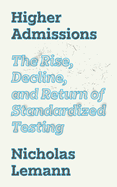
Standardized testing is a contentious issue rarely far from public attention. Anyone invested in the promise of equitable higher education and social mobility will find Higher Admissions: The Rise, Decline, and Return of Standardized Testing an instructive and thought-provoking read. Nicholas Lemann, dean emeritus of the Graduate School of Journalism at Columbia University, provides the central text, and Patricia Gándara, Marvin Krislov, and Prudence L. Carter provide complementary arguments and commentary.
The authors take as their point of departure the claim that "talent is distributed across the nation and world but access to opportunity is not." They delve into the social, political, and economic contexts that shaped the rise of standardized tests of intellectual aptitude, tracing their origins to the early 20th century, when this kind of testing was positioned as a meritocratic tool that would democratize the elite levels of higher education. This historical lens is critical because of the way it illuminates the connections between educational policy, social inequality, and the American dream.
Lemann convincingly debunks the idea that any of these tests have ever done what they initially claimed: to reveal a neutral, bias-free, "natural" determination of intelligence. In fact, the more ubiquitous the tests became, the more they reinforced economic privilege as students spent more time and resources preparing for them. Nor are tests an adequate predictor for how well a particular student will do in college, outside of their first year. Instead, Higher Admissions investigates other criterion, such as grades, by which students might be evaluated, and issues a call for a more inclusive and ambitious investment in educating American students. --Elizabeth DeNoma, executive editor, DeNoma Literary Services, Seattle, Wash.

